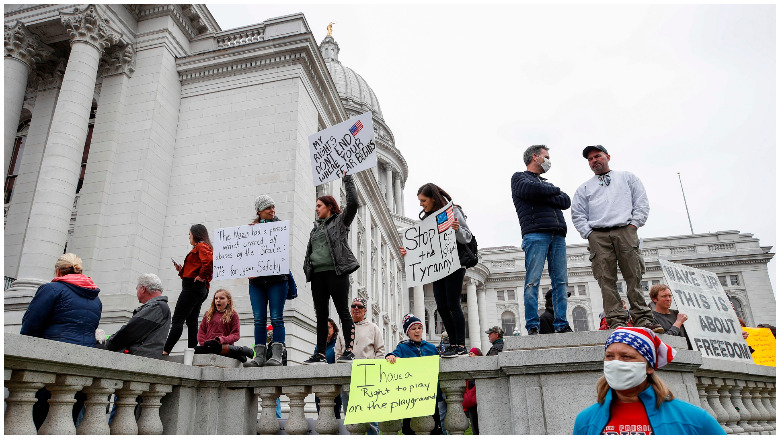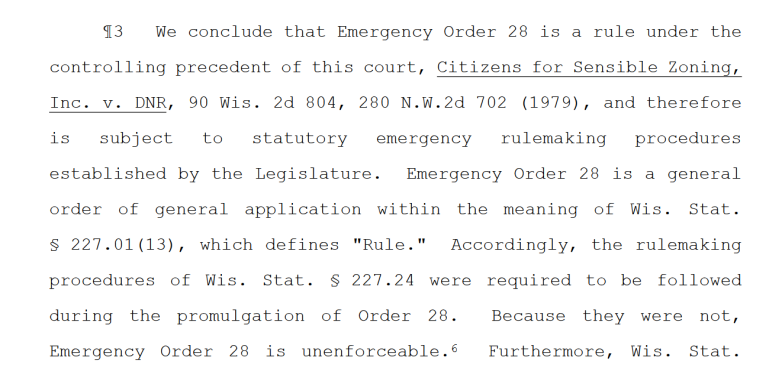
The Wisconsin Supreme Court has ruled that the state’s Safer at Home order to combat COVID-19 is “unenforceable” because the Department of Health Services secretary who signed it didn’t involve the state Legislature. DHS Secretary Andrea Palm’s “Emergency Order 28 is declared unlawful, invalid, and unenforceable,” the court wrote.
You can read the decision here. It was released on May 13. If Democratic Gov. Tony Evers’ administration issues a new order, it now has to go through the state Legislature’s rulemaking committee, which is Republican-controlled, the court ruled. The court largely split on partisan lines with all justices in the majority from its conservative wing. You can see Palm’s biography here. She previously worked as Senior Counselor to the U.S. Secretary of Health and Human Services in Washington D.C. and was a senior health policy advisor to then-Senator Hillary Clinton.
The court didn’t choose to grant the 6-day stay that the Legislature sought. Local orders in some areas, like the City of Milwaukee, are still in effect.
The earlier order by Evers to deal with the COVID-19 pandemic, followed by Palm’s extension, has sharply divided the state, leading to protests. Order’s first order was issued March 12, 2020 and was called, “Declaring a Health Emergency in Response to the COVID-19 Coronavirus.” It was not the subject of the court’s decision, however, as it expired.

Court rulingA key section from the Supreme Court ruling in Wisconsin.
The court noted:
If we were to read the definition of ‘Rule’ as Palm suggests, one person, Palm, an unelected official, could create law applicable to all people during the course of COVID-19 and subject people to imprisonment when they disobeyed her order.
According to the court majority, “Palm cannot point to any procedural safeguards on the power she claims. At oral argument, she continuously referenced judicial review; but judicial review takes place after n allegation is made that an individual’s rights have been violated.”
In a dissent, Justice Rebecca Dallet wrote that the “majority reaches its conclusion by torturing the plain language of Wis. Stat. §252.02(2017-18)1 and completely disregarding the long-standing, broad statutory powers the Legislature itself granted to the Department of Health Services (DHS) to control COVID-19, a novel contagion.
Brian Hagedorn, a conservative-backed justice, who also dissented, noted, “Some would like to characterize this case as a battle over the constitutional limits on executive power——can an executive branch officer really shut down businesses, limit travel, and forbid public gatherings? These are important questions for sure, but they are not what this case is about. No party has raised or developed such a claim.” He noted: “the legislature has not alleged, nor can I identify, any harm to the legislature as a constitutional body for which this court can grant relief.”
Here’s what you need to know:
The Legislature Petitioned the Court to Invalidate the Order & the Court Agreed, Saying Palm ‘Did Not Follow the Law’
The Wisconsin Legislature had petitioned the court for action against Secretary Designee Andrea Palm, who signed the order because the governor’s earlier safer at home order could not be extended past 60 days without Legislative inclusion. Palm issued her order without including the Legislature.
Pat Roggensack delivered the majority opinion. Conservative Justices Annette Ziegler, Rebecca Bradley and Dan Kelly joined in the majority. Ann Walsh Bradley filed a dissenting opinion, in which Rebecca Dallet joined. Justice Brian Hagedorn also filed a dissenting opinion.

Wisconsin Supreme Court ruling
The court found that Andrea Palm’s Emergency Order 28 “is a rule under the controlling precedent of this court… and therefore is subject to statutory emergency rulemaking procedures established by the Legislature.”
The court added, “Accordingly, the rulemaking procedures of Wis. Stat. §227.24 were required to be followed during the promulgation of Order 28. Because they were not, Emergency Order 28 is unenforceable.” The court added: “Because Palm did not follow the law in creating Order 28, there can be no criminal penalties for violations of her order.”
The court added:
We do not conclude that Palm was without any power to act in the face of this pandemic. However, Palm must follow the law that is applicable to state-wide emergencies. We further conclude that Palm’s order confining all people to their homes, forbidding travel and closing businesses exceeded the statutory authority of Wis. Stat. §252.02 upon which Palm claims to rely.
The court also found that, “Crimes created by the Legislature in statutes must have specificity in order to be enforceable.”
Roggensack wrote:
This case is about the assertion of power by one unelected official, Andrea Palm, and her…order to all people within Wisconsin to remain in their homes, not to travel and to close all businesses that she declares are not ‘essential’ in Emergency Order 28. Palm says that failure to obey Order 28 subjects the transgressor to imprisonment for 30 days, a $250 fine or both. This case is not about Governor Tony Evers’ Emergency Order or the powers of the Governor.
The court decision says that the Legislature filed an emergency petition asserting that Palm as Secretary-designee of the Department of Health Services (DHS) “broke the law when she issued Emergency Order 28 after failing to follow emergency rule procedures required” under Wisconsin statutes and that even if rulemaking was not required, she “exceeded her authority by ordering everyone to stay home, closing all ‘non-essential’ businesses, prohibiting private gatherings of any number of people who are not part of a single household, and forbidding all ‘non-essential’ travel. Palm responded that Emergency Order 28 is not a rule. Rather, it is an Order, fully authorized by the powers the Legislature assigned to DHS under Wis. Stat. §252.02.”
The case revolved around the question of the DHS secretary’s power to act in a health emergency without legislative input and how far she could go. The Legislature’s goal was to have a seat at the table. The Legislature didn’t make a Constitutional challenge in this case. During oral arguments, the Legislature’s attorney made it clear the lawmakers were not making a challenge on questions of free speech, religion, assembly, and so forth.
The Legislature’s lawyer argued that lawmakers could craft something that would meet constitutional muster if they had a seat at the table. The questions before the court were complicated but important questions about the nature of an order vs. a rule and concepts like general order of general application. The lawyer for DHS told the Supreme Court during oral arguments that people would die if the court invalidated the Palm order.
The Legislature conceded DHS had the power to ban large public gatherings and close schools. During oral arguments, some of the conservative justices seemed to focus on the question of how the unelected Palm could have the power to create an order that includes criminal penalty when there is no legislatively created statute on the books that specifies the underlying conduct as criminal (i.e., opening your small business or traveling for non-essential reasons in defiance of the order).
They questioned which statute outlining the supposed criminal conduct they could turn to if someone convicted of such a crime brought a challenge to them, and they questioned how a DHS secretary could criminalize conduct not specified by the Legislature.
During the oral arguments, the attorney for DHS likened COVID-19 to a wildfire and DHS to a fire department. He said the legislative intent in authorizing DHS to issue orders on public health emergencies was to allow for quick reaction to a fast-moving situation. He likened this to a fire department needing to enforce mandatory evacuation or even taking down a house to build a fire barrier to stop a fast-moving wildfire
During those arguments, Justice Rebecca Bradley raised deep concern about having a lack of limits on the unelected DHS secretary’s powers. She brought up Japanese internment camps to question how far Palm’s unchecked power could go if upheld by the court.
It was questioned why Evers and Palm didn’t just reach out to the Legislature as this all unfolded weeks ago. Concern was raised about an unelected DHS secretary with no direct accountability to the electorate making the most sweeping order in state history. Concern was also raised about the Legislature’s inability to act fast enough in a fast-breaking outbreak and the DHS lawyer also stated the Legislature couldn’t possible foresee every possible scenario
The lawyer for the Legislature focused on the argument about whether the order required the Legislature’s inclusion because it didn’t spell out specific entities but rather applied in sweeping fashion to everyone in the state. He conceded that a narrower order applied to say only Milwaukee County might have been allowed depending on how it was written.
In its decision, the court noted that the crux of the Legislature’s case was that Emergency Order 28 “was promulgated without following required statutory procedures applicable to an emergency.”
The court also noted that it was choosing not to “define the precise scope of DHS authority under Wis. Stat. §252.02(3), (4) and(6) because clearly Order 28 went too far.”
In her concurrence, Rebecca Bradley wrote, However well-intentioned, the secretary-designee of the Department of Health Services exceeded her powers by ordering the people of Wisconsin to follow her commands or face imprisonment for noncompliance…Indeed, it is in the midst of emergencies that constraints on government power are most important.”
In his concurrence, Kelly wrote that Palm “has taken control of a stunningly broad swath of the lives and activities of every single individual and business in the State of Wisconsin.”
READ NEXT: California Doctor Criticizes State’s COVID-19 Approach